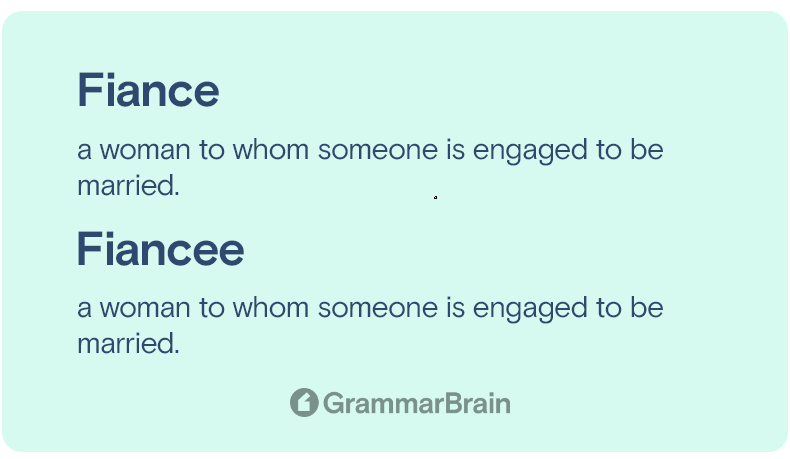Is it fiance or fianceé? What is the correct way to spell the upcoming marriage of a womanly partner? Learn the key differences and correct spelling in this short American English guide.
Which is the correct usage? Fiance vs fianceè
If you have often been confused about the differences between fiancé and fiancée or worried about introducing your engaged paramour with the correct term, you are probably not alone. Both iterations are spelled correctly, but they have a key point of difference and are hence employed to refer to different gendered partners.
Fiancé and fiancée are closely related terms, but there is generally a concern about which one denotes a man and woman.
| Word | Definition |
| fiancé | a man to whom someone is engaged to be married. |
| fianceé | a woman to whom someone is engaged to be married. |
Meanings (fiance vs fianceè)
Since fiancé and fiancée share the same pronunciation, this has given rise to uncertainties in the linguistic world about their right usage. They have their etymological roots in French where each of the two words has a gender-specific meaning.
When you want to introduce the man you are engaged to, you use the word fiancé. But when you want to introduce the woman you are going to marry, you use the word fiancée.
So this has no connection to the gender identity of the person who is marrying them and only refers to their future significant other.

Sentence examples (fiance vs fianceè)
- My fiancée has stated that she wants to hold a small wedding ceremony with our friends and family present.
- I cannot wait to introduce my fiancé to you!
- Carol did not inform her family that she will be tying the knot with her fiancée next week because her family is homophobic.
- I’m so elated that my fiancé bought me a car as my pre-wedding gift.
- My fiancée and I have been apart for six months, and I finally get to meet her tomorrow.
- My parents are very open-minded and loved my fiancé after they met him despite us being American and him being Indian.
- I’ve been taking dancing lessons with my fiancée who is a big fan of jazz and wants to impress our guests with a slow dance routine.
Differences (fiance vs fianceè)
In recent times, there has been a movement to make the English language more gender inclusive and people are using pronouns that are neutrally denotive of gender identities. Viewing the world in strictly binary or heteronormative terms is no longer considered progressive. Still, fiancé and fiancée are a pair of words that have not been able to shed their gender-indicative existence.
A lot of this puzzlement stems from the fact that French reserves only a small distinction between the men and women who are to be married. There are separate but closely related words in most languages to indicate relationships between people. Understanding the nuances and differences between them is important to identify or address a person.
Likewise, the implied meaning of fiancé or fiancée can have multiple synonymous meanings such as your lover, beloved, sweetheart or darling. But the words themselves can strictly and specifically only refer to your future husband or future wife, or a male-identifying or female-identifying person.
Conclusion
Both the words remain to be an essential part of human life that are frequently employed in daily conversations. If you still feel doubtful about which one to use, remember that fiancé which refers to men has only one “e”.
But fiancée has “ée” to denote the “extra elegance” that we associate with women rather than men. You cannot go wrong this way and can introduce your spouse-to-be with confidence next time!
Inside this article
Fact checked:
Content is rigorously reviewed by a team of qualified and experienced fact checkers. Fact checkers review articles for factual accuracy, relevance, and timeliness. Learn more.
Core lessons
Glossary
- Abstract Noun
- Accusative Case
- Anecdote
- Antonym
- Active Sentence
- Adverb
- Adjective
- Allegory
- Alliteration
- Adjective Clause
- Adjective Phrase
- Ampersand
- Anastrophe
- Adverbial Clause
- Appositive Phrase
- Clause
- Compound Adjective
- Complex Sentence
- Compound Words
- Compound Predicate
- Common Noun
- Comparative Adjective
- Comparative and Superlative
- Compound Noun
- Compound Subject
- Compound Sentence
- Copular Verb
- Collective Noun
- Colloquialism
- Conciseness
- Consonance
- Conditional
- Concrete Noun
- Conjunction
- Conjugation
- Conditional Sentence
- Comma Splice
- Correlative Conjunction
- Coordinating Conjunction
- Coordinate Adjective
- Cumulative Adjective
- Dative Case
- Determiner
- Declarative Sentence
- Declarative Statement
- Direct Object Pronoun
- Direct Object
- Diction
- Diphthong
- Dangling Modifier
- Demonstrative Pronoun
- Demonstrative Adjective
- Direct Characterization
- Definite Article
- Doublespeak
- False Dilemma Fallacy
- Future Perfect Progressive
- Future Simple
- Future Perfect Continuous
- Future Perfect
- First Conditional
- Irregular Adjective
- Irregular Verb
- Imperative Sentence
- Indefinite Article
- Intransitive Verb
- Introductory Phrase
- Indefinite Pronoun
- Indirect Characterization
- Interrogative Sentence
- Intensive Pronoun
- Inanimate Object
- Indefinite Tense
- Infinitive Phrase
- Interjection
- Intensifier
- Infinitive
- Indicative Mood
- Participle
- Parallelism
- Prepositional Phrase
- Past Simple Tense
- Past Continuous Tense
- Past Perfect Tense
- Past Progressive Tense
- Present Simple Tense
- Present Perfect Tense
- Personal Pronoun
- Personification
- Persuasive Writing
- Parallel Structure
- Phrasal Verb
- Predicate Adjective
- Predicate Nominative
- Phonetic Language
- Plural Noun
- Punctuation
- Punctuation Marks
- Preposition
- Preposition of Place
- Parts of Speech
- Possessive Adjective
- Possessive Determiner
- Possessive Case
- Possessive Noun
- Proper Adjective
- Proper Noun
- Present Participle
- Prefix
- Predicate



